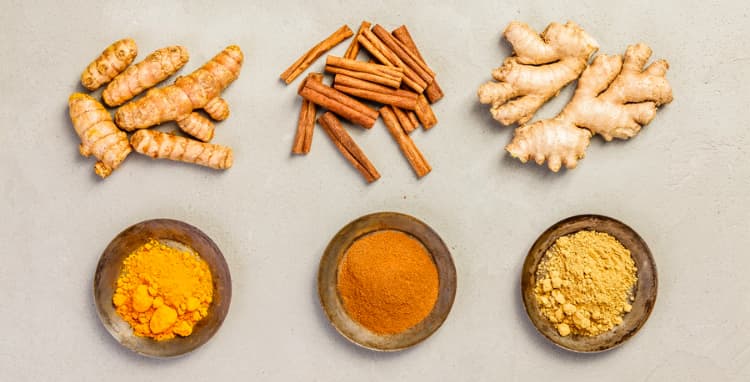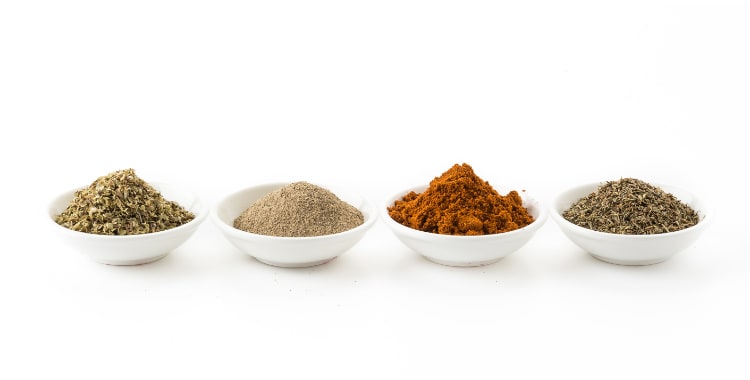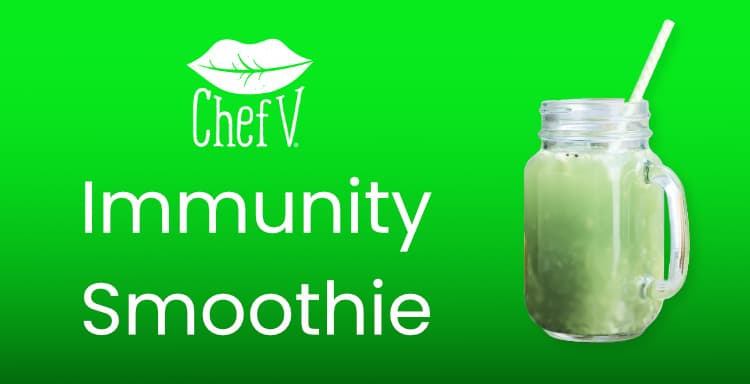Out of tens of thousands of medicinal plants on Earth, only a tiny percentage have been classified as “adaptogens.” Over the last few years, adaptogenic herbs have become a huge health trend.
Certified nutritional therapist and ChefV.com founder Veronica “V” Kress explains what’s so special about adaptogens and managing stress.

Fungus is finally friendly!
While adaptogens, also called adaptogenic herbs, have soared in popularity, relatively few people know exactly what makes an herb adaptogenic. So let’s get to know them…
One of the top selling points for adaptogens is that they help regulate the amount of stress hormone, cortisol, released from the adrenal glands. In doing so, they help your body healthily adapt to stress.
It wasn’t long ago that mushrooms were just a squishy, flavorless topping for pizza or a second-tier ingredient in a stir-fry. Only eccentric people were fond of fungus for food.
Now all of a sudden, mushrooms are all the rage. Reishi, Lion’s Mane, Chaga and other fruiting fungal bodies now enjoy A-list, red-carpet superfood status. Mushroom coffee? Unthinkable a decade ago. But these days, more and more people are breaking up with coffee and sipping functional fungal elixirs instead. These edible ‘shrooms, mostly in powder form, are examples of adaptogens.

What Are Adaptogens?
They’re the cream of the crop of the medicinal plant world. According to the Center for Biological Diversity, 50,000 to 80,000 plants are used medicinally. Although there’s no exact number of adaptogenic herbs on the planet, the number of herbs classified as ‘adaptogenic’ doesn’t exceed a few hundred. Some plant medicine experts put the number far lower, at a few dozen.
So what makes adaptogens the darling of the plant medicine world? Well, as the name implies, adaptogens help the body “adapt” to stress. Running an Organic Green Drink delivery company, doing everything in my power to keep costs low for my customers despite inflation and the soaring cost of goods and services, and nursing a newborn? Yup, I got some stress.
That’s why I’ll typically add an adaptogenic powder to my protein smoothie, which I take about 30 minutes after fueling my cells with Organic Green Drink in the morning. I’ll tell you which adaptogens are my favorites below, and suggest some Smoothie recipes to add them to.
(I should also mention that I have reduced the frequency and dosage of adaptogens now that I’m breastfeeding. There’s no telling if baby Kaden will get a sudden burst of energy and skip naptime because the power of adaptogens came through my breastmilk!)
To be classified as an adaptogen, herbalists and botanists generally agree on a few principles:
- Non-Specific Action: Think about a prescription medicine you’ve taken. That drug was designed to have one specific action, like lowering blood pressure or blood sugar or inhibiting serotonin reuptake. In comparison, adaptogens don’t just have one action. Instead, they help the body adapt to any kind of stress in a non-specific way.
- Promote homeostasis: Adaptogens restore balance to the body. They do this by regulating physiological processes. One of the top selling points for adaptogens is that they help regulate the amount of stress hormone, cortisol, released from the adrenal glands. In doing so, they help your body healthily adapt to stress.
- Non-Toxic and Safe: Unlike pharmaceuticals and many non-adaptogenic herbs, adaptogens are generally considered safe and have a low risk of toxicity and side effects.
- Biphasic: This means that adaptogens can have either an energizing or calming effect. For example, adaptogens can help the adrenal glands crank out more cortisol when needed or reduce the amount when the adrenals flood the bloodstream with cortisol like a burst dam. Adaptogens help energize an underperforming organ and reduce activity in a hyperactive one.

ADD ADAPTOGENS
TO THESE SMOOTHIE RECIPES
Chef V's Smoothie Recipes
Chef V’s Immunity Smoothie
Piña Kale’oda Smoothie
Chef V Tropical Smoothie
Green Protein Smoothie with Kale
Adaptogens you might use are described below.

When Were Adaptogens First Discovered?
No, Gwyneth Paltrow was not the first adaptogenic trailblazer (despite what the Goop blog may say). That credit goes to Soviet scientists in the 1940s like Dr. Nikolai Lazarev and later, to doctors Israel Brekhman and Alexander Panossian.
Research on adaptogens in the mid-20th century was conducted when the Soviet Union was competing neck-for-neck with the USA for global superpower status. Russian scientists discovered that when soldiers, athletes and workers were given the adaptogenic herb, eleuthero (Siberian ginseng), they could perform at high levels under intense stress such as little sleep and extreme weather.
But the history of adaptogenic herbs dates much further back than a century. These special medicinal herbs (and fungi) have been used since prehistoric times. And what’s really interesting about many of the most commonly used adaptogens is their own resiliency to stress.


Adaptogens Have Their Own Stress To Deal With
Adaptogens don’t have to worry about paying the bills. But many of them do have to survive under the harshest conditions. For example, I already mentioned Eleuthero. That grows in the harsh taiga of Siberia, where hardly any other plants can take root.
Another adaptogen that survives freezing conditions is Rhodiola root, which grows in high-altitude Arctic regions.
Maca root has developed a reputation as a libido enhancer and hormone balancer. If it can survive the harsh Peruvian Andes climate, with hurricane-force winds, blinding sunlight and miserable soil, maybe Maca can make miracles happen in the bedroom. (This study says Maca can help reverse sexual dysfunction in postmenopausal women who took antidepressants.)
Another example of a fascinating tale of survival in the plant kingdom is the adaptogen known as holy basil (Tulsi). Native to the scorching-hot, arid Indian subcontinent, holy basil thrives even under desperate drought conditions.
One more example is Ashwagandha. Like holy basil, this adaptogen thrives in arid, hot AF India as well as North Africa and the Middle East.
Just as these adaptogenic herbs have not only survived but thrived in harsh climates, they can help us adapt to stress and support our own resilience and well-being, even in the face of adversity.
What Are The Benefits Of Adaptogens?
Adaptogens might be the ultimate natural stress-busters. And in helping our bodies adapt to stress in a balanced, non-specific way, they may also help:
- Support immune function
- Promote energy, vitality, stamina and endurance
- Improve mental clarity
- Balance mood
- Calm the mind
What Are The Best Adaptogens?
In addition to the adaptogens I mentioned, the following ones have shown promise in research studies:
- Licorice root
- Goji berry
- Schisandra fruit
- Astragalus
- Angelica root
- Acai berry
- Shatavari

Do Adaptogens Really Work?
Instead of asking me, let’s see what the research says. According to a review of several studies published in 2021, in the journal Nutrients, “adaptogens could provide a number of benefits in the treatment of chronic fatigue, cognitive impairment, and immune protection. In the future, there is great potential to register medicinal products that contain plant adaptogens for therapeutic purposes.”
Earlier this year, a study focusing on adaptogens and skin health concluded:
“Adaptogens can repair the skin barrier and maintain skin homeostasis by … influencing the oxidative stress pathway to inhibit inflammation, and regulating the extracellular matrix (ECM) components to maintain a dynamic equilibrium, ultimately achieving the treatment of skin diseases and the maintenance of a healthy state.”
Drug companies can’t patent adaptogenic herbs and make huge profits. So there are no large human clinical trials on adaptogens. Considering they’ve been used for thousands of years and our way of life seems to only be getting more stressful, I highly recommend adaptogens. But I’ll still pass on the mushroom pizza.
This content is for informational or educational purposes only and does not substitute professional medical advice or consultations with healthcare professionals.

















































